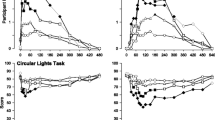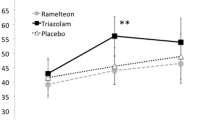Abstract
Since macrolide antibiotics inhibit the oxidative hepatic metabolism of various drugs, including midazolam, the present double blind studies were conducted to find out if azithromycin, a new macrolide of the azalide type, would inhibit the metabolism of midazolam and enhance the effects of midazolam on human performance. In Study I, 64 healthy medical students, divided in four parallel groups received placebo, midazolam (10 mg or 15 mg), and midazolam 10 mg combined with azithromycin (500mg+250mg). In Study II, three males received oral midazolam 10 mg in combination with placebo, azithromycin or erythromycin 750 mg (as a positive control) in a cross-over trial. Objective and subjective tests were done before the intake of midazolam and 30 and 90 min after it, and venous blood was sampled for the assay of midazolam.
In the placebo group in Study I, the mean numbers of letters cancelled (LC) at baseline, 30 min and 90 min were 21, 20 and 20, respectively, and the corresponding mean numbers of correct digit symbol substitutions (DSS) were 126, 137 and 140, indicating a practice effect. Midazolam 10 mg impaired these performances (21, 13 and 12 for LC, and 127, 113 and 111 for DSS). Either dose of midazolam produced clumsiness, mental slowness and poor subjective performance, midazolam 15 mg being slightly more active. The corresponding, scores in the azithromycin + midazolam group were 21, 16, 16 for LC, and 132, 121 and 119 for DSS, the only significant difference from placebo being the impairment of DSS at 90 min. The combination differed from midazolam 15 mg in producing less drowsiness and mental slowness. In Study II, mean plasma midazolam concentrations (μg·1-1) after erythromycin + midazolam 10 mg were 0 (baseline), 168 (30 min) and 113 (90 min), which were higher than the values (0, 79 and 41) after placebo + midazolam. The corresponding concentrations (μg·1-1) after azithromycin + midazolam (0, 85 and 46) were similar to those found after placebo + midazolam. Erythromycin but not azithromycin enhanced the objective and subjective effects of midazolam. Our results suggest that as azithromycin, unlike erythromycin, does not interfere with midazolam metabolism, it also does not enhance the effects of midazolam.
Similar content being viewed by others
References
Descotes J, André P, Evreux JC (1985) Pharmacokinetic drug interactions with macrolide antibiotics. J Antimicrob Chemother 155: 659–664
Fabre G, Crevat-Pisano P, Dragna S, Covo J, Barra Y, Cano JP (1988) Involvement of the macrolide antibiotic inducible cytochrome P-450 LM3c in the metabolism of midazolam by microsomal fractions prepared from rabbit liver. Biochem Pharmacol 37: 1947–1953
Periti P, Mazzei T, Mini E, Novelli A (1992) Pharmacokinetic drug interactions of macrolides. Clin Pharmacokinet 23: 106–131
Peters DH, Friedel HA, McTavish D (1992) Azithromycin. A review of its antimicrobial activity, pharmacokinetic properties and clinical efficacy. Drugs 44: 750–799
Kronbach T, Mathys D, Umeno M, Gonzalez FJ, Meyer UA (1989) Oxidation of midazolam and triazolam by human liver cytochrome P450IIIA4. Mol. Pharmacol 36: 89–96
Gascon M-P, Dayer P (1991) In vitro forecasting of drugs which may interfere with the biotransformation of midazolam. Eur J Clin Pharmacol 41: 573–578
Olkkola KT, Aranko K, Luurila H, Hiller A, Saarnivaara L, Himberg J-J, Neuvonen PJ (1993) A potentially hazardous interaction between erythromycin and midazolam. Clin Pharmacol Ther 53: 298–305
Mattila MJ, Idänpään-Heikkilä JJ, Törnwall M, Vanakoski J (1993) Oral single doses of erythromycin and roxithromycin may increase the effects of midazolam on human performance. Pharmacol Toxicol 73: 180–185
Mattila ME, Mattila MJ, Nuotto E (1992) Caffeine moderately antagonizes the effects of triazolam and zopiclone on the psychomotor performance of healthy subjects. Pharmacol Toxicol 70: 286–289
Laaksonen U-M, Heiskanen A (1991) Screening and quantitation of benzodiazepines in serum samples. In: Kæmpe B (Ed) Forensic toxicology. Proceedings of the 29th International Meeting, Mackenzie, Copenhagen, June 24–27
Davila D, Kolachny-Babic L, Plavsic F (1991) Pharmacokinetics of azithromycin after single oral dosing of experimental animals. Biopharm Drug Distrib 12: 505–514
Mazzaei T, Surrenti C, Novelli A, Crispo A, Fallani S, Carla V, Surrenti E, Periti P (1993) Pharmacokinetics of azithromycin in patients with impaired hepatic function. J Antimicrob Chemother 13 [Suppl E]: 57–63
Zarowitz, BJM, Szefler SJ, Lasezkay GM (1981) Effects of erythromycin base on theophylline kinetics. Clin Pharmacol Ther 29: 601–605
Author information
Authors and Affiliations
Rights and permissions
About this article
Cite this article
Mattila, M.J., Vanakoski, J. & Idänpään-Heikkilä, J.J. Azithromycin does not alter the effects of oral midazolam on human performance. Eur J Clin Pharmacol 47, 49–52 (1994). https://doi.org/10.1007/BF00193477
Received:
Accepted:
Issue Date:
DOI: https://doi.org/10.1007/BF00193477




